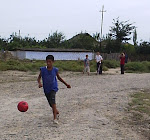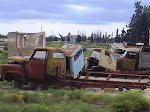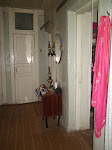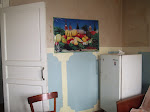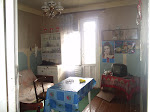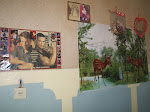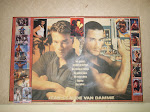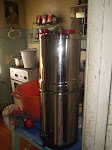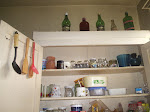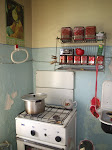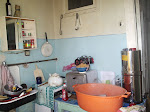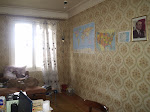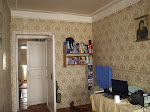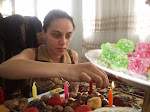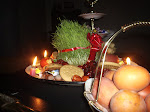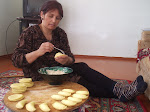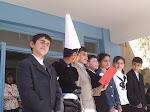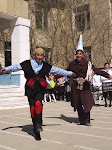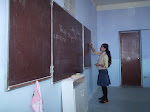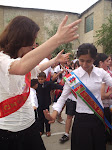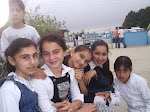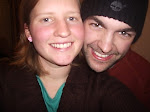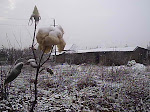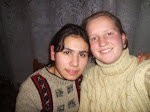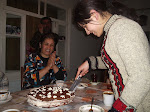I understand how her hands move in the steam, how she cuts the potatoes to boil and later mash, but just barely the words she speaks.
Muzaffar, on the other hand, who is trilingual, has his tiny paws wrapped around my ankle. He bites at my flip-flop. “Does Muzaffar want some piroshkies?” I hang my arms so he jumps to nibble at the tips of my fingers.
My host mother rolls her eyes and lures me to her cutting board. “Gal, Sasha, gal.” In the damp outdoor kitchen she demonstrates that with this knife she will cut and these onions to add the kartof that’s boiling here. My eyes burn from a distance. I assume that she will add at least a kilo of butter to the mix.
Lala scoots around the front of the house, faster than our puppy. She jogs upstairs to grab a potholder. Unlike my host mother in Sumgait Lala has fewer children, enabling her to grind beef, soak goose for a salty soup base, pickle eggplant, tomato, cucumber and green pepper, and knead and bake three to five loaves of wheat bread before the sun sets on the west side of the Kur. Then she hems pants. I don’t know for whom, but they’re all men’s pants, and it happens a lot.
She returns to slice three onions and slides them into the boiling grease on the gas stove. Using her wrist she brushes back her bangs to her gaudy gold and black patterned clip. They fall back to her almond eyes. I’ve never seen her thick strands flow to compliment her soft cheeks.
Back from the top kitchen, Lala calls. We are to roll out the hardening dough rising in the white vat. It reminds me of the playdough my mother would knead so she could read in her room, without three rugrats. Up top and bending down she pulled ingredients from the pantry: flour, water and a little bit of baking soda to hold the dough together. And they were magic, the tiny bottles of food coloring she handed us so we could dye our creation as well as our fingers.
I watch Lala as the dough sways in her hands, quickly yet elegantly into a sphere. My first try looks swollen and somehow discolored, like the roads that pave my village. Lala smears oil onto my palms so the dough will smooth out; it doesn’t, but Lala doesn’t mind. We make 60 medium- to large-sized balls.
Xanam, my host sister, is seated on her bed perpendicular to the stove. “My mother needs your help today. She is very busy. She must make piroshkies before five then prepare dinner. Then she must sew pants.” Over the sewing machine is draped trousers and white lining.
Lala bounces downstairs, and up again with the pot that has been drained. She hands me the potato masher, a kind that I’ve never used in the United States. I smash away. Sneaking a bite every few minutes, Lala turns for my opinion. “Yaxshi,” I nod. Dipping her index finger, she adds a dash of salt and tries it again. “Indi, yaxshi,” she says. Facing the kitchen garden, we set the mashed potatoes on the uneven, cracked, cool, open window.
The phone rings. “I’m here, outside, Sasha.” Emil has brought me the 1,674-page 2003 English-Azerbaijani dictionary, and the zero-degree sleeping bag my host mother views the same way as she does my headlamp. Strange things come from America.
On the crumbling brick patio I learn that Emil is fasting and is to take a 14-day vacation in a week.
“Is there any thing you would like me to clarify with your host mother before I leave?”
I begin, “I go in my room at night not because I don’t like her family but because it’s too much.”
“Bashadushmadum, bashadushmadum,” she laughs.
“Every day it’s Azerbaijani culture, Azerbaijani school, the language barrier, Azerbaijani teaching, Azerbaijani neighbors and food... In America,” I pause because I know very well where I am, “we have a lot of alone time. We just grew up this way. It’s how we regroup.” I use the palms of my hands to mold my head into the sphere it should be.
As my mother and I switch roles, as Emil expresses my concerns, her wispy bangs fall to her smile and she nods.
Emil lets himself out the back door, and my host mother and I climb the stairs to the kitchen above. Silence fills the room like smoke from burning dough.
She demonstrates how to flatten the dough and pull the sides into a petite oval shape. While I work on form she mixes the browned onions with the potatoes. The leaven is thick, three quarters of an inch, rising to the ceiling. We take turns flattening and stretching, spooning into the dough the cool potato filling. We fold one side over, rolling our thumb hard to lock the potato in. Like a wet cloth we fold it over again and flip it on its back. We do this 30 times instead of 60, since Emil is fasting. We lay them across the table in rows. In red they would look like juicy fruit rollups.
Near completion Lala moves soft strings of hair from above her brow. She lights the stove by match and fills the pan a quarter-inch thick with sunflower oil.
With tongs she places, one, two, three piroshkies onto the grill. “Sasha, gal.” She lets me take control, and warns me when the smoke melodramatically dances from the pan.
“Jeez, Bagishlayam.”
“Problem yoxdur!” she laughs.
I burn a few but the edible ones are heavy, like bread sticks, not like the grease-encrusted piroshkies fried by street vendors in Sumgait. With this measurable difference I consume four in one sitting. This is more bread than I usually eat in a week.
We do not make the spicy red sauce, but I suspect it’s because a bit of pepper with a meal has my family scrunching their face and shoving bread to their tongue.
In the morning, however, my sister sets three piroshkies on top of the chocolate wafers and vanilla circus biscuits. A tinge of fig murabba with piroshkie sets it apart from the ubiquitous boiled egg and bread and butter breakfast.
My mother tells my host father and sister that I had made the piroshkies. If only they understood how the dough, every day, truly rises.
Self-published in the Azlander, Vol. 4, isuue 4
Sunday, October 7, 2007
9/9/07
I haven’t written in a couple weeks, at least. I mean, I write in my journal. Then hide it in my bag. I tell myself it is so I will write while I’m on the Marshutkas, the mean autobuses that taxi us around and fall apart. But that is not true, I never write away from my room. My door is always shut.
Two weeks ago I thought I was done with this job. The heat, the trash, the cows eating the trash, the yells and barks from dogs and students, the ass-to-face bus rides, the same red and black checkered dresses, and the daily potato, chicken and tomato dinner, with extra extra butter made me want to quit. It was a couple weeks after summer school, when motivation was waning, and my headache was routine. Eric and I went to the Internet café and searched for flights to anywhere but here: Mexico, Costa Rica. We could teach English in Japan or Thailand. We could try a totally different organization altogether, a non-governmental organization. But we went home idealess. We couldn’t afford a way out.
People call Peace Corps a roller coaster.
The last semi-roller coaster I went on was Drop Zone. We jumped on and belted our waists in with stainless steal straps. The Six Flags staff made their round, wiggling the bright purple machine to make sure we didn’t jump before they could drop us. I can see a bolt amongst the hundreds on the side of the track, slipping from its secure position, rubbing the bolt that acts as its ladder above it, then securing itself to the rusted belt, and doing this more times than I could endure.
When the first belt made the clenching sound I thought to myself, Oh my God, oh my God, oh my God, and I looked to my friend Crystal for compassion.
Then the kid warranting Crystal’s compassion away said that I shouldn’t be scared, that this was like his fifth time he’d been on this thing and that the ride is so much fun every time. His sister cuddled to his right. She seemed used to his lies.
We reached a certain point, maybe five feet above ground, and the repetition became audible, “Oh my God, oh my God, oh my God.” Crystal looked at me with a laugh, so I closed my eyes and then repeated again, “Oh my God, oh my God, oh my God.” I continued this way all the way to the top.
In between spurts of “Oh my God, oh my God, oh my God” this kid kept chatting with us like it was an escalator ride in the Westbury Mall. “It’s such a nice day. How’s your day going?” This boy’s voice and black high-top Nikes told me he’s like most 13-year-olds: awkward, and prematurely confident. He wore camouflage shorts to hide his fears.
As he talked above us, we threw our commentary. “Does he have any idea what’s going on here?” I asked. “What the hell is going on?” He kicked the still blue air. I breathed in, according to the bolts’ patterned climb. As we reached the top he stretched his short arms out to San Jose and pressed his lips: “What a beauuutiful view!” he shouted. Crystal shrugged, and I smiled and clenched the thick bars that protected me. “What a beauuutiful view!”
In these brief 15 seconds at the top that seemed like eternity, I was torn between my fear of heights, the anxiety of being dropped, and all the feelings that came along with this boy: self-assuredness, stupidity, humor, and the love of San Jose.
The drop didn’t fling my legs like I imagined. It was quick and scary as hell, and came with an “Oh shit!” at the start, but in my heart was a quick unknown and a constant rush.
When we hit the bottom we were secure. The kid jiggled in his seat till staff unbuckled his waist. Like a pro he jumped with two sneakers flat to the surface.
I haven’t written in a couple weeks, at least. I mean, I write in my journal. Then hide it in my bag. I tell myself it is so I will write while I’m on the Marshutkas, the mean autobuses that taxi us around and fall apart. But that is not true, I never write away from my room. My door is always shut.
Two weeks ago I thought I was done with this job. The heat, the trash, the cows eating the trash, the yells and barks from dogs and students, the ass-to-face bus rides, the same red and black checkered dresses, and the daily potato, chicken and tomato dinner, with extra extra butter made me want to quit. It was a couple weeks after summer school, when motivation was waning, and my headache was routine. Eric and I went to the Internet café and searched for flights to anywhere but here: Mexico, Costa Rica. We could teach English in Japan or Thailand. We could try a totally different organization altogether, a non-governmental organization. But we went home idealess. We couldn’t afford a way out.
People call Peace Corps a roller coaster.
The last semi-roller coaster I went on was Drop Zone. We jumped on and belted our waists in with stainless steal straps. The Six Flags staff made their round, wiggling the bright purple machine to make sure we didn’t jump before they could drop us. I can see a bolt amongst the hundreds on the side of the track, slipping from its secure position, rubbing the bolt that acts as its ladder above it, then securing itself to the rusted belt, and doing this more times than I could endure.
When the first belt made the clenching sound I thought to myself, Oh my God, oh my God, oh my God, and I looked to my friend Crystal for compassion.
Then the kid warranting Crystal’s compassion away said that I shouldn’t be scared, that this was like his fifth time he’d been on this thing and that the ride is so much fun every time. His sister cuddled to his right. She seemed used to his lies.
We reached a certain point, maybe five feet above ground, and the repetition became audible, “Oh my God, oh my God, oh my God.” Crystal looked at me with a laugh, so I closed my eyes and then repeated again, “Oh my God, oh my God, oh my God.” I continued this way all the way to the top.
In between spurts of “Oh my God, oh my God, oh my God” this kid kept chatting with us like it was an escalator ride in the Westbury Mall. “It’s such a nice day. How’s your day going?” This boy’s voice and black high-top Nikes told me he’s like most 13-year-olds: awkward, and prematurely confident. He wore camouflage shorts to hide his fears.
As he talked above us, we threw our commentary. “Does he have any idea what’s going on here?” I asked. “What the hell is going on?” He kicked the still blue air. I breathed in, according to the bolts’ patterned climb. As we reached the top he stretched his short arms out to San Jose and pressed his lips: “What a beauuutiful view!” he shouted. Crystal shrugged, and I smiled and clenched the thick bars that protected me. “What a beauuutiful view!”
In these brief 15 seconds at the top that seemed like eternity, I was torn between my fear of heights, the anxiety of being dropped, and all the feelings that came along with this boy: self-assuredness, stupidity, humor, and the love of San Jose.
The drop didn’t fling my legs like I imagined. It was quick and scary as hell, and came with an “Oh shit!” at the start, but in my heart was a quick unknown and a constant rush.
When we hit the bottom we were secure. The kid jiggled in his seat till staff unbuckled his waist. Like a pro he jumped with two sneakers flat to the surface.
Week 10: Permanent Site Visit
This open road is bleak. It is dry, and the diesel from cars exhausts the once-breathable hot air. Mountains shade the background like smog, and the barren land empties away.
I am coming back from the village where I will live for two years. The road to it has no aesthetic appeal: desolate, eerily quiet. The land’s shade comes only from rusted oilrigs drilling through the hard earth.
It creeps from behind increasingly green foliage. In a village, far enough away from oilrigs is my home. With cows and chickens and geese to eat the mosquitoes, we have tomatoes, cucumbers, pomegranates and figs. We own a puppy, which they caught for me, generically named Toclan (a common name for dogs here) who I will rename Muzaffar, after my language and culture teacher. The shower and toilet are outside, but I can deal, though I wonder what we will do in the winter. There is a major river running through town, which means I can sit to read and write in the humidity and on the muddy bank. I move September 13. I am totally stoked.
I am coming back from the village where I will live for two years. The road to it has no aesthetic appeal: desolate, eerily quiet. The land’s shade comes only from rusted oilrigs drilling through the hard earth.
It creeps from behind increasingly green foliage. In a village, far enough away from oilrigs is my home. With cows and chickens and geese to eat the mosquitoes, we have tomatoes, cucumbers, pomegranates and figs. We own a puppy, which they caught for me, generically named Toclan (a common name for dogs here) who I will rename Muzaffar, after my language and culture teacher. The shower and toilet are outside, but I can deal, though I wonder what we will do in the winter. There is a major river running through town, which means I can sit to read and write in the humidity and on the muddy bank. I move September 13. I am totally stoked.
8/10
My family likes their daily keg TV: Poorly produced Turkish sitcoms, music videos, Disney and Warner Bros. cartoons, imported serials, traditional instruments and vocal specials, and every once in a while Discovery Channel documentary. When the electricity goes out they have no idea what to do. Usually Mom goes to bed, Dad takes off to a café I’m supposing, and the kids either sit around and eat watermelon or, surprisingly, try their damndest to use their imagination. With a school system that has children translate from text to learn English, it’s times like this my brothers and sister struggle to keep their senses stimulated.
Today, after a 10-minute regression of acting out commercials, they switched to a game where they would hang a noun above one another’s head. They had to guess what the word above was, but no clues were given. They asked questions to the person sitting in the chair like, Is it big? Does it smell? Where’s it from? When I was invited to play, I answered questions, making up an elaborate story of this small little man on my finger named Herman who is a million years old and speaks every language on Earth, and I explained all of it in English. It was the longest running turn: at least 75 seconds. But No, the noun was Trash. No laughter, I got it wrong.
Narin asked if I knew any games, and off the top of my head I came up with “Eye Spy” and “Two Truths and a Lie.” “Eye spy with my little eye something… white.” Without a pause, he shrugs, “Wall.” “There are other white things in the room besides the wall, Hikmet.” “No, it’s boring game.” Then I vetoed Two Truths since I realized they live in together, thereby probably knowing every thing about each other. I told Hikmet he should read a book and gave him an 826 Quarterly. He flipped through it and set it down. “I don’t like to read.” A quick factual quiz game incurred until Dad came home and demanded chai. I went into my room and shut the door behind so the wind wouldn’t slam the heavy thing shut. I opened to page 25 in Gabriel Garcia Marquez’s Collected Novellas, to take me further from home, and maybe to set an example for a kid if he knocked. No more than two minutes later I heard fuzz and the voice of the Turkish hit man blasting from the living room.
My family likes their daily keg TV: Poorly produced Turkish sitcoms, music videos, Disney and Warner Bros. cartoons, imported serials, traditional instruments and vocal specials, and every once in a while Discovery Channel documentary. When the electricity goes out they have no idea what to do. Usually Mom goes to bed, Dad takes off to a café I’m supposing, and the kids either sit around and eat watermelon or, surprisingly, try their damndest to use their imagination. With a school system that has children translate from text to learn English, it’s times like this my brothers and sister struggle to keep their senses stimulated.
Today, after a 10-minute regression of acting out commercials, they switched to a game where they would hang a noun above one another’s head. They had to guess what the word above was, but no clues were given. They asked questions to the person sitting in the chair like, Is it big? Does it smell? Where’s it from? When I was invited to play, I answered questions, making up an elaborate story of this small little man on my finger named Herman who is a million years old and speaks every language on Earth, and I explained all of it in English. It was the longest running turn: at least 75 seconds. But No, the noun was Trash. No laughter, I got it wrong.
Narin asked if I knew any games, and off the top of my head I came up with “Eye Spy” and “Two Truths and a Lie.” “Eye spy with my little eye something… white.” Without a pause, he shrugs, “Wall.” “There are other white things in the room besides the wall, Hikmet.” “No, it’s boring game.” Then I vetoed Two Truths since I realized they live in together, thereby probably knowing every thing about each other. I told Hikmet he should read a book and gave him an 826 Quarterly. He flipped through it and set it down. “I don’t like to read.” A quick factual quiz game incurred until Dad came home and demanded chai. I went into my room and shut the door behind so the wind wouldn’t slam the heavy thing shut. I opened to page 25 in Gabriel Garcia Marquez’s Collected Novellas, to take me further from home, and maybe to set an example for a kid if he knocked. No more than two minutes later I heard fuzz and the voice of the Turkish hit man blasting from the living room.
Food Installment #1
Week 7
8/8/07
They said it would get hotter in August, but it is the difference in temperature between spring and summer in Sacramento. The stockings I must wear in the classroom are ripped off when I enter our home, which is often the same bubbling heat as the blacktop outside. To cool our bodies way down we eat watermelon. Like tomato, it seems there is enough watermelon to fill our plates and to have between meals. Apparently back in the ‘80s Gorbachev went on an anti-alcohol campaign and replaced all the grape vineyards in Azerbaijan with watermelon. So every day when I come home from school, and every night before I go to bed, we gorge on the succulent, bright, life-saving melon. Thank paranoid Soviet prohibition for that.
Summer fruit is ripening, so pomegranates, blackberries and figs are selling like watermelon in bazaars. To prepare a semi preserve called murabba, I helped my mother poke holes with a fork, twice, in hundreds of summer plums. She placed the plums in a separate vat and topped the fruit with an amount of sugar that would scare the Keebler elves. The bowl boiled for hours on the gas stove. We snacked on some not long after it set, but the best serving was a morning later. A tinge of the sweet jam set it apart from the ubiquitous boiled egg, and bread and butter breakfast.
Like sugar in murabba, the amount of butter and salt used in dishes here is obscene. Every meal—dolmasi, potato wedges, badimcan (eggplant) and pomidor (tomato)—has mounds of butter and salt added. I think our family of six goes through a brick-sized block every day. No good stories, just a lota butta weighin’ me down.
8/8/07
They said it would get hotter in August, but it is the difference in temperature between spring and summer in Sacramento. The stockings I must wear in the classroom are ripped off when I enter our home, which is often the same bubbling heat as the blacktop outside. To cool our bodies way down we eat watermelon. Like tomato, it seems there is enough watermelon to fill our plates and to have between meals. Apparently back in the ‘80s Gorbachev went on an anti-alcohol campaign and replaced all the grape vineyards in Azerbaijan with watermelon. So every day when I come home from school, and every night before I go to bed, we gorge on the succulent, bright, life-saving melon. Thank paranoid Soviet prohibition for that.
Summer fruit is ripening, so pomegranates, blackberries and figs are selling like watermelon in bazaars. To prepare a semi preserve called murabba, I helped my mother poke holes with a fork, twice, in hundreds of summer plums. She placed the plums in a separate vat and topped the fruit with an amount of sugar that would scare the Keebler elves. The bowl boiled for hours on the gas stove. We snacked on some not long after it set, but the best serving was a morning later. A tinge of the sweet jam set it apart from the ubiquitous boiled egg, and bread and butter breakfast.
Like sugar in murabba, the amount of butter and salt used in dishes here is obscene. Every meal—dolmasi, potato wedges, badimcan (eggplant) and pomidor (tomato)—has mounds of butter and salt added. I think our family of six goes through a brick-sized block every day. No good stories, just a lota butta weighin’ me down.
Subscribe to:
Posts (Atom)



